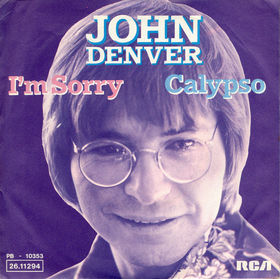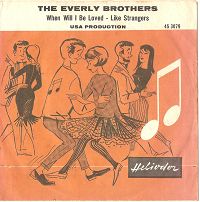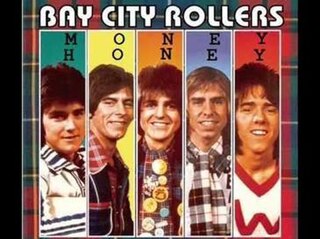
"You're My Best Friend" is a song by the British rock band Queen, written by the band's bass player, John Deacon, who wrote it for and about his wife. It was first included on the 1975 album A Night at the Opera, and later released as a single. The ballad also appeared on the Live Killers (1979) live album, and on the compilation albums Greatest Hits (1981), Absolute Greatest (2009) and Queen Forever (2014).

"You're All I Need to Get By" is a song recorded by the American R&B/soul duo Marvin Gaye and Tammi Terrell and released on Motown Records' Tamla label in 1968. It was the basis for the 1995 single "I'll Be There for You/You're All I Need to Get By" from Method Man and Mary J. Blige.

"Ain't Nothing Like the Real Thing" is a 1968 single released by American R&B/soul duo Marvin Gaye and Tammi Terrell, on the Tamla label in 1968. The B-side of the single is "Little Ole Boy, Little Ole Girl" from the duo's United LP. The first release off the duo's second album: You're All I Need, the song—written and produced by regular Gaye/Terrell collaborators Ashford & Simpson—became a hit within weeks of release eventually peaking at number eight on the US Billboard Hot 100 and number one on the Hot Soul Singles chart, the first of the duo's two number-one R&B hits. In the UK "Ain't Nothing Like the Real Thing" reached number 34.

"I'm a Believer" is a song written by Neil Diamond and recorded by the American band the Monkees in 1966 with the lead vocals by Micky Dolenz. The single, produced by Jeff Barry, hit the number-one spot on the U.S. Billboard Hot 100 chart for the week ending December 31, 1966, and remained there for seven weeks becoming the last number-one hit of 1966 and the biggest-selling single for all of 1967. Billboard ranked the record as the number-five song for 1967. While originally published by Screen Gems-Columbia Music (BMI), it is now published by Stonebridge Music/EMI Foray Music (SESAC), with administration passed to Sony Music Publishing and Universal Music Publishing Group.

"Emma" is a 1974 song by the British soul band Hot Chocolate. Written by band members Errol Brown (vocals) and Tony Wilson (music), the song address themes of suicide, early death and lost childhood. Brown's lyrics celebrate his recently deceased mother. Their rawness was developed after the producer Mickie Most asked him for further "depth and darkness".

"Working My Way Back to You" is a song made popular by the Four Seasons in 1966 and the Spinners in 1980.

"Yummy Yummy Yummy" is a song by Arthur Resnick and Joey Levine, first recorded by Ohio Express in 1968. Their version reached No. 4 on the U.S. Pop Singles chart in June and No. 5 on the UK Singles Chart. It has since been covered by many artists. Ohio Express was a studio concoction and none of the "official" members appear on the record. Joey Levine sang lead vocals.

"Montego Bay" is a song co-written and performed by Bobby Bloom about the city in Jamaica of the same name. The song was a top ten hit for Bloom in the Fall of 1970 on both sides of the Atlantic. It reached No. 3 on the UK Singles Chart, No. 5 on the Canadian RPM 100 Singles Chart, No. 7 on the Australian Go-Set Singles Chart and No. 8 on the US Billboard Hot 100. The song was co-written and produced by Jeff Barry. In the master tape of the song, Bloom breaks into a chorus of "Oh, What a Beautiful Mornin'" at the end of the recording. The song features a whistler, as well as Jamaican instruments in a calypso style.

"Hair" is the title song to the 1967 musical Hair and the 1979 film adaptation of the musical.

"Opus 17 (Don't You Worry 'bout Me)" is a song composed by Sandy Linzer and Denny Randell and recorded by The Four Seasons in 1966 for their album Working My Way Back to You.

"I'm Sorry" is a song written and recorded by American country-folk singer-songwriter John Denver and released in 1975. It was the final number-one pop hit released during his career. The flip side of "I'm Sorry" was "Calypso", and, like its A-side, enjoyed substantial radio airplay on Top 40 stations.

"Rock On" is a song written by English singer David Essex. Recorded in 1973 and released as a single by Essex, it became an international hit. In 1989, American actor and singer Michael Damian recorded a cover version that went to number one on the Billboard Hot 100 chart. The song has been recorded many times, including a 2006 version by the English hard rock group Def Leppard.

"Never My Love" is a pop standard written by American siblings Don and Dick Addrisi, and best known from a hit 1967 recording by the Association. The Addrisi Brothers had two Top 40 hits as recording artists, but their biggest success as songwriters was "Never My Love". Recorded by dozens of notable artists in the decades since, in 1999 the music publishing rights organization Broadcast Music, Inc. (BMI) announced it was the second most-played song on radio and television of the 20th century in the U.S.

"When Will I Be Loved" is a popular song written by Phil Everly of the Everly Brothers, who had a US top-ten hit with it in 1960. Linda Ronstadt covered the song in 1975, and her version was an even bigger hit in the US, peaking at No. 2. Vince Gill also covered it in 1994 on the soundtrack of the film 8 Seconds.

"1, 2, 3, Red Light" is a song written by Sal Trimachi and Bobbi Trimachi and was recorded by 1910 Fruitgum Company for their 1968 album, 1, 2, 3, Red Light. The song charted highest in Canada, going to number 1 on the RPM 100 national singles chart in 1968. In the same year in the US, it went to number 5 on the Billboard Hot 100 and was on the charts for 13 weeks.

"Money Honey" is the title of a 1975 international hit single by the Bay City Rollers, taken from their album Rock n' Roll Love Letter and in the UK on their album Dedication. The power-pop recording was issued in the US as the album's lead single in January 1976, reaching number nine on the Hot 100 in Billboard magazine that March. "Money Honey" was the Bay City Rollers' second US Top 10 hit. It reached number seven on the Cash Box chart. The follow-up single was the album's title track, "Rock and Roll Love Letter". In the UK, "Money Honey" was released in November 1975 and reached number three, becoming the group's ninth Top 10 single.

Giuliano e i Notturni were an Italian pop group, active in the late 1960s.

"Gimme Gimme Good Lovin'" is a song written by Joey Levine and Ritchie Cordell and performed by Crazy Elephant. It reached #12 on both the Billboard Hot 100 and the UK Singles Chart in 1969, and was featured on their 1969 album, Crazy Elephant.

"Every 1's a Winner" is the third single from the 1978 Hot Chocolate album of the same name. The single was released on 4 March 1978 on RAK Records in the UK and Infinity Records in the US. It peaked at number 12 on the UK Singles Chart and number 6 on the US Billboard Hot 100; it was the band's second-highest-charting single in the US, behind "You Sexy Thing".

"Moonflight" is a song written and originally recorded by Vik Venus in 1969. It is a 'break-in' song, with popular hits of the day interspersed at humorous points throughout the song in response to spoken-word prompts, in the style of Dickie Goodman, who had many such hits. "Moonflight" became a hit during the summer of '69, reaching #38 U.S. Billboard and #23 Cash Box. It also charted in Canada, where it reached #20. It did best in South Africa, however, where it reached #7.



















